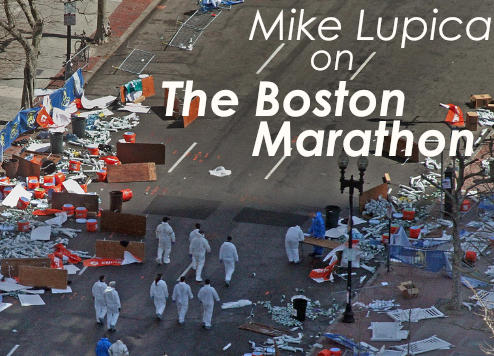
It’s “the capital of happy people.”
It’s Times Square on New Year’s Eve. Except on a spring day.
Mike Lupica has covered some 20 Boston Marathons in his tenure as an internationally-known sports reporter, so he would know.
But Monday’s marathon had Lupica drawing a more haunting comparison: the image of crowds running away from the two bombs that went off on Boylston Steet near the finish line called to mind the hysteria at the Twin Towers, on what was formerly a beautiful day in September 2001.
“For this to happen on this day is why all of us took it so personally,” said Lupica of the attacks. “Everybody in Boston feels like they either know someone in the race or someone who’s watching the race. That’s why people felt like it was an attack on all of them,” he added.
Indeed the bombings, which President Obama is calling acts of terror, tarnished what Lupica described as “the happiest day of the year in Boston.” And the incongruity of terror where there would be celebration, tears and screams in what was a sea of smiles, dark clouds of smoke in the blue sky of a warm April afternoon, is what hit Lupica the hardest.
“It doesn’t matter whether you finish in three and a half hours, four and a half hours, whenever, the finish line is this incredibly celebratory place. The thing that struck me the most was to see people running away from the finish line of the marathon instead of running towards it,” Lupica said.
Lupica is no stranger to Boston. He attended college there, and has returned endless times to cover sporting events for the New York Daily News and ESPN.
In the wake of these horrors, Lupica acknowledges that certain heightened security measures will most likely take place for future runnings of the race.
“There was a time in London where they had all these iconic red phone booths but now there are no phone booths because the IRA started putting bombs in them,” Lupica said. “Are we gonna see no trash cans along the race route? Yes. They may take the mailboxes off the street. We always react in a smart way to these things,” he added.
But despite possible changes in security, Lupica stresses the importance of not letting these events, or any terrorist acts, result in a life of fear.
“That’s what they want. They want us to feel like we’re not safe,” he said. Lupica added, discussing what he told his own 14 year old daughter as well as speaking on behalf of all parents, “we want you to still live lives of triumph and adventure.”
Perhaps the best example of the desired resilience that Lupica describes comes from the marathon runners themselves. Lupica, who was in Boston in the aftermath of the bombings, describes a decided indignation among those for whom the bombs had prevented from finishing the race.
“They know this day is supposed to be one of triumph,” Lupica said.












































